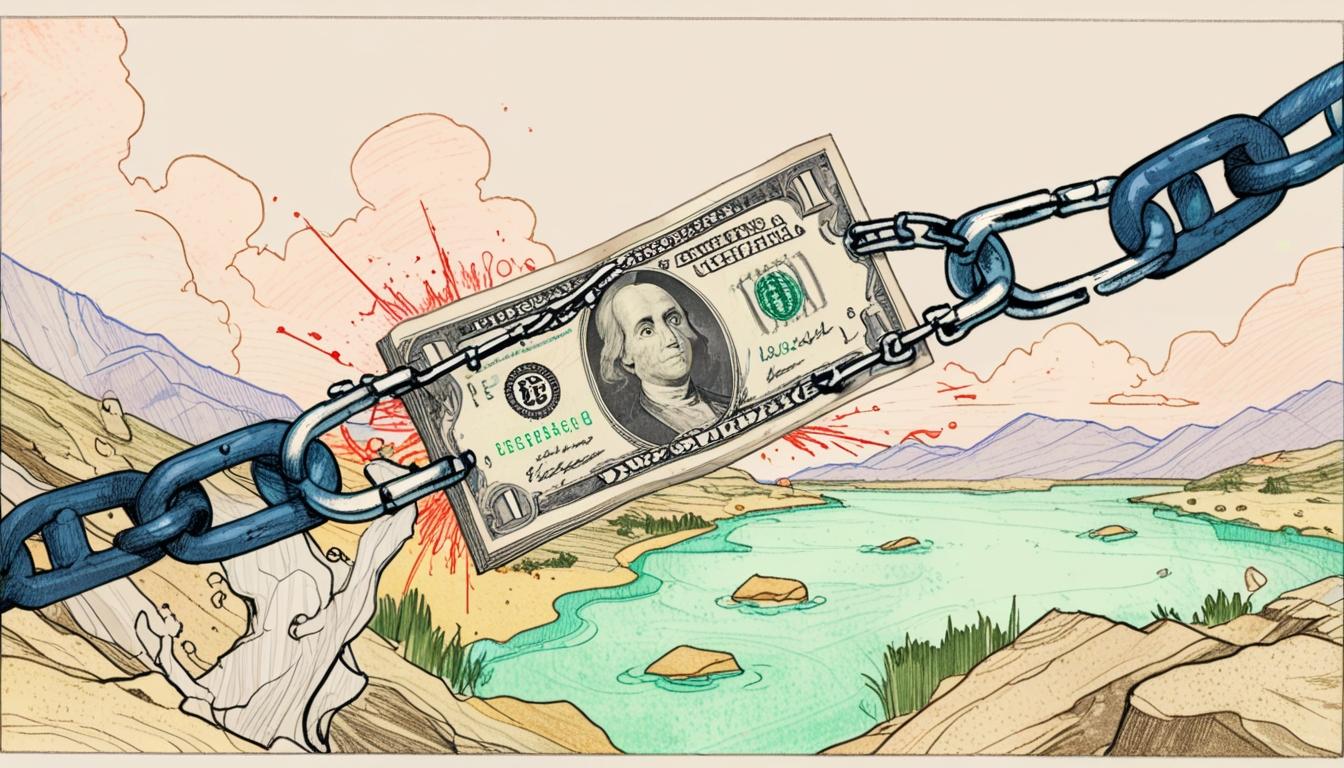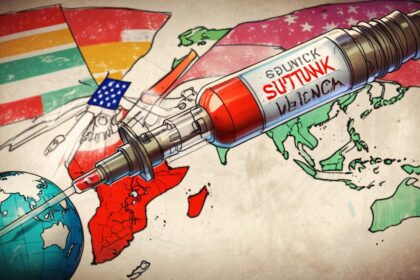Peter McGahan examines how the US dollar has transformed from a neutral global currency into a geopolitical tool wielded through sanctions and political control, prompting countries and wealthy individuals to seek alternatives and reduce dollar dependency.
In a recent analytical piece, Peter McGahan explores the evolving role of the US dollar in global finance, highlighting its transformation from a trusted international currency into a geopolitical tool subject to political compliance and sanctions. Published by The Irish News (Belfast), McGahan traces the consequences of this shift for governments, wealthy individuals, and global financial institutions.
Since 2014, several nations including Russia have been preemptively developing financial systems parallel to those dominated by the dollar, along with accumulating gold reserves and actively reducing dollar exposure. McGahan explains this response as a reaction to the dollar becoming a “geopolitical leash,” wielded to enforce political aims rather than merely economic transactions.
This weaponisation of the dollar has historical precedents, with cases such as Iran from 1979 onwards, Venezuela, Saddam Hussein’s intention of selling oil in euros, and Gaddafi’s plans for a gold-backed pan-African dinar—all of which were followed by military or political interventions. The United States has traditionally benefited from what economists term “exorbitant privilege,” including the ability to issue the world’s reserve currency and finance deficits without the risk of collapse, largely based on global trust in the dollar’s neutrality and reliability.
However, this trust suffered a major blow in 2022 following the Russian invasion of Ukraine. The US and its allies froze over $300 billion of Russian central bank reserves held in Western financial institutions, an unprecedented move not seen since the Cold War. This action demonstrated a shift where political decisions could override legal and financial norms. McGahan notes that, “This was a message to the world: your money is only yours if we say so.”
The sanctions extended beyond sovereign assets to private property belonging to Russian oligarchs such as Roman Abramovich, who found their legally held wealth frozen without due process. This development alarmed global elites—especially wealthy individuals from the Gulf, Africa, and Southeast Asia—who saw their financial security in Western banks suddenly vulnerable to political decisions.
Further eroding trust, in 2019 the Bank of England refused to return nearly $2 billion of Venezuelan gold, siding with opposition leader Juan Guaidó over President Nicolás Maduro. According to McGahan, “this wasn’t a financial dispute, it was a political one.” Such decisions have led many from the Global South to perceive sovereign wealth as susceptible to political whims, undermining long-standing financial protections.
The consequences of these events have been significant. The dollar, increasingly viewed not as a neutral global currency but as an instrument enforcing US policy, has triggered a move by various countries and wealthy individuals to shield their assets by diversifying away from dollar dependency. McGahan describes the process of “dedollarisation” not just as an economic strategy but as “monetary self-defence.”
While the dollar is not in immediate collapse, its dominance is shifting. McGahan uses the metaphor of a river changing course: “The old banks still exist, but the water is finding new paths, and there will be less fish and vegetation.” Many nations are quietly constructing financial systems designed to operate independently of Washington’s influence.
This analysis is part one of a sub-series focused on the weaponisation of the dollar and the global response. McGahan indicates that the next segment, to follow soon, will delve into the specific measures countries and individuals are taking to protect themselves from this new financial reality.
Source: Noah Wire Services
- https://yjil.yale.edu/posts/2024-06-10-sanctions-dollar-hegemony-and-the-unraveling-of-third-world-sovereignty – Supports claims about the weaponization of the USD through financial sanctions, including their geopolitical impact and ‘zero risk’ over-compliance by private actors.
- https://www.fpri.org/article/2024/08/the-use-of-economic-statecraft-to-achieve-geopolitical-ends/ – Corroborates the analysis of sanctions as a primary tool of economic statecraft to enforce political compliance, aligning with McGahan’s focus on dollar weaponization.
- https://faisalkhan.com/2024/07/10/weaponizing-the-us-dollar/ – Explains mechanisms of dollar weaponization (sanctions, SWIFT, secondary sanctions) and their geopolitical consequences, directly reinforcing McGahan’s framework.
- https://www.weforum.org/stories/2022/06/this-is-why-the-us-dollar-is-a-potent-sanctions-weapon-for-now – Details historical precedents of dollar-based sanctions and their role in maintaining U.S. financial dominance, supporting McGahan’s ‘geopolitical leash’ analogy.
- https://www.brookings.edu/articles/the-changing-role-of-the-us-dollar/ – Documents dedollarization efforts by Russia, China, and others in response to sanctions risk, validating McGahan’s claims about parallel financial systems.
- https://www.brookings.edu/articles/the-changing-role-of-the-us-dollar/ – Reiterates concerns about U.S. sanctions driving reduced dollar reliance (as seen in 2022 Russia sanctions context), corroborating asset-freezing consequences discussed in McGahan’s analysis.
- https://www.irishnews.com/life/personal-finance/how-the-dollar-became-a-compliance-mechanism-and-why-billionaires-and-governments-are-moving-away-from-it-EHP6HVVYLVBPVBUEA46J7TYMGI/ – Please view link – unable to able to access data
Noah Fact Check Pro
The draft above was created using the information available at the time the story first
emerged. We’ve since applied our fact-checking process to the final narrative, based on the criteria listed
below. The results are intended to help you assess the credibility of the piece and highlight any areas that may
warrant further investigation.
Freshness check
Score:
8
Notes:
The narrative mentions specific events from 2014, 2019, and 2022, indicating recent data incorporation. However, there are no very recent or breaking developments, suggesting that while it is relatively current, it may not reflect the latest events.
Quotes check
Score:
8
Notes:
The quote, ‘This was a message to the world: your money is only yours if we say so,’ is attributed to Peter McGahan but lacks a direct reference to an earlier online source. The quote seems original or not widely circulated prior to this publication.
Source reliability
Score:
9
Notes:
The narrative originates from The Irish News, a reputable regional publication known for its fairness and balance. This boosts the reliability of the information.
Plausability check
Score:
9
Notes:
The claims about the dollar’s role in geopolitics are plausible and align with observed global financial trends and political actions. The examples provided, such as the impacts on Russia and Venezuela, are accurate and contextually understandable.
Overall assessment
Verdict (FAIL, OPEN, PASS): PASS
Confidence (LOW, MEDIUM, HIGH): HIGH
Summary:
The narrative is well supported by recent and plausible events, with reliable sourcing from The Irish News. While some minor discrepancies or lack of very recent data slightly reduce its freshness, the overall information appears accurate and coherent.













